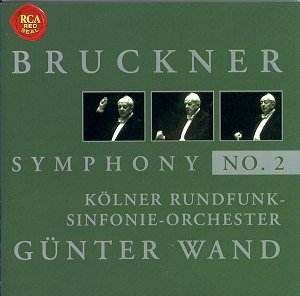For Wand, as for many conductors, Bruckner really starts
with the Third. He never performed the first two un-numbered symphonies
and after his Cologne Radio recordings of the canonic nine, 1 and 2
are conspicuous by their absence from his many remakes. In his last
interview he went some way to explaining why:
‘I will not conduct the First Symphony because
it is an ailing piece. I consider this music to be totally unwell.
Bruckner was in a phase when he was in very ill health, and one
can feel this in this symphony, just as one can feel it in Schumann’s
Second Symphony… But Bruckner’s Second Symphony has some beautiful
moments. The second movement… that is beautiful. But we have this
recording.’
… the last phrase implying, ‘and I don’t need to make
another one’. (The curiosity about Wand’s strong opinions about the
First is that he chose to record it in the later Vienna version of 1891,
which is now all but repudiated in favour of the original Linz version
of 1865. He makes a strong case for it, but the original version stands
on far steadier legs).
As Robert Simpson says in his invaluable study, ‘After
all this harping on inequalities in no.2, it is necessary to describe
it as a most beautiful symphony, too little known.’ The very first,
mobile string subject, quickly answered by a brass motif that both manages
to stand on one note and yet press forward suspensefully, is one of
his most exciting inspirations. That many of the later themes and practices
of orchestration are so reminiscent of late Schubert is not a slur on
Bruckner’s originality of thought but a recognition of his artistic
heritage and of his years of study in Vienna with Simon Sechter, Schubert’s
teacher.
In view of the work’s pedigree, Wand’s determination
to maintain the music’s flow is an idiomatic one, even if it is at the
occasional expense of its potential for grandeur, especially in the
finale (where of those conductors who perform Haas’s edition of the
1877 version, Wand is almost the fleetest of all). In this last recording
of the Cologne cycle, Wand’s players follow him through its contrapuntal
intricacies with fewer mishaps and greater care for tonal beauty than
earlier instalments. Given the first horn’s heroic playing in the second
subject of the Adagio and its transformation, it’s all the sadder that
Wand denies him his moments of radiant glory at the close of that movement
and, in common with some others, assigns his part to the clarinet. Wand’s
treatment of the Adagio, though, is especially successful, easeful where
Karajan is almost inappropriately intense and Haitink flaccid, without
underplaying the chromatic outerworld where Bruckner sometimes, surprisingly
takes his themes (all of which have a devotional character and the second
is a straight lift from the Benedictus of his F minor Mass).
The scherzo could benefit from more of Karajan’s intensity;
also from the observance of the second-half repeat of the Scherzo (he
takes that marked for the first half) and from a little more time over
the swinging but by no means cloudless Trio. The coda to this movement
is thrilling; it seems a shame that Bruckner abandoned the idea of twisting
the material for his Scherzos at their conclusion so early on: this
appeared to be the last one until Haitink performed one of similarly
unpredictable character on his second recording of the Third a decade
ago: now it is commonplace.
Where Bruckner becomes trickier to follow in the Finale
Wand relaxes considerably for the unexpectedly serene second theme,
but otherwise grips the music perhaps a little tightly for its own good.
Here Giulini is unmatched at drawing the threads together with Classical
restraint and entirely individual verve. I don’t know of a recording
of the Second which is ideal, but Wand comes as close as most - and
happily the engineers appear to have cured the balance problems and
raw brass noise which afflict the Eighth and Ninth from a couple of
years earlier.
Peter Quantrill


